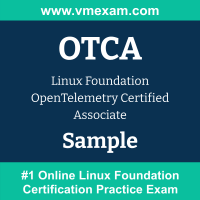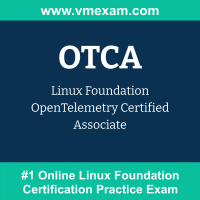
Observability has rapidly evolved from a nice-to-have to a critical requirement for modern, cloud-native applications. With complex, distributed systems spanning containers, microservices, and multiple cloud environments, understanding how data flows, where failures occur, and how to optimize performance is essential. OpenTelemetry has emerged as the leading open-source observability framework, providing a unified way to collect, process, and export telemetry data for metrics, traces, and logs. If you’re looking to validate your expertise in OpenTelemetry and observability practices, obtaining the OTCA Certification (OpenTelemetry Certified Associate) is a strategic move.
This blog will walk you through everything you need to know - from exam structure to expert preparation tips - to pass the OTCA Exam confidently.
What is OTCA Certification?
The OpenTelemetry Certified Associate (OTCA) credential, offered by the Linux Foundation, is designed for developers, SREs, DevOps engineers, and IT professionals looking to demonstrate foundational knowledge of OpenTelemetry. It focuses on key concepts, tools, and best practices used in modern observability pipelines.

 We have prepared Linux Foundation OpenTelemetry Certified Associate (OTCA) certification sample questions to make you aware of actual exam properties. This sample question set provides you with information about the OpenTelemetry Associate exam pattern, question formate, a difficulty level of questions and time required to answer each question. To get familiar with OpenTelemetry Certified Associate (OTCA) exam, we suggest you try our
We have prepared Linux Foundation OpenTelemetry Certified Associate (OTCA) certification sample questions to make you aware of actual exam properties. This sample question set provides you with information about the OpenTelemetry Associate exam pattern, question formate, a difficulty level of questions and time required to answer each question. To get familiar with OpenTelemetry Certified Associate (OTCA) exam, we suggest you try our  We are committed to helping you clear your Linux Foundation OTCA Certification exam. You can easily pass
We are committed to helping you clear your Linux Foundation OTCA Certification exam. You can easily pass